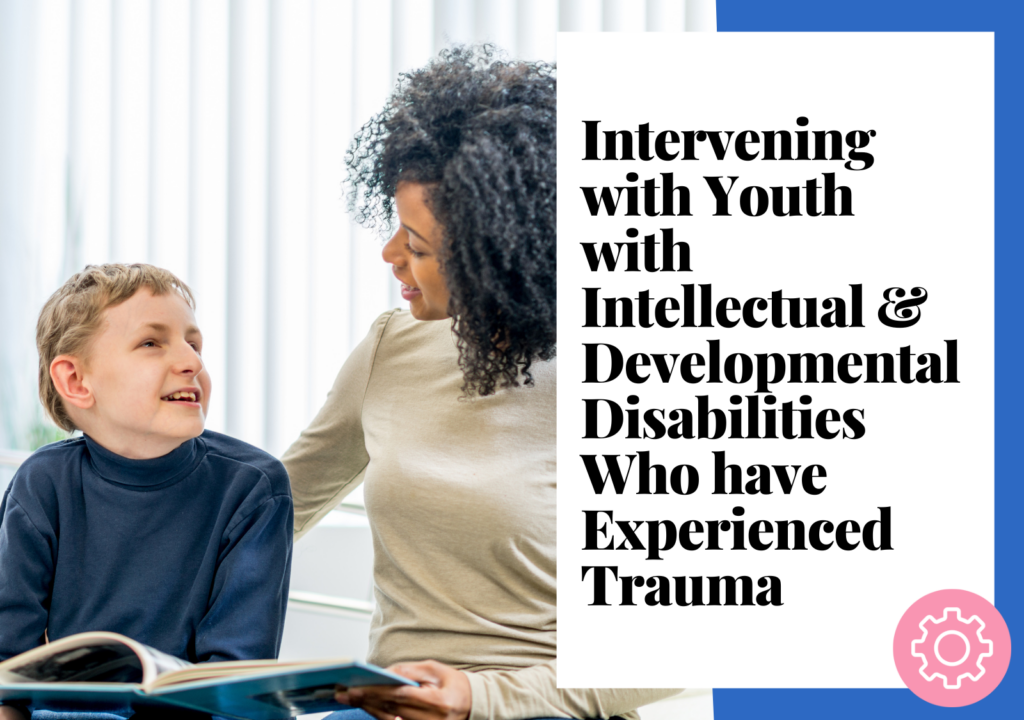Intervening with Youth with Intellectual & Developmental Disabilities Who have Experienced Trauma
This training was presented on
August 22, 2023
2:00 – 4:00 P.M. PDT

This training will focus on individual and systems-level interventions for youth where Intellectual/Developmental Disabilities (IDD) are present at the same time as a history of traumatic stress. Specific techniques will be discussed, including Trauma-Focused CBT (TF-CBT) as it is currently the model with the most research scrutiny for this population. Different types of traumatic stress (e.g., PTSD vs. Developmental Trauma Disorder) will be reviewed, as well as why these differentiations are especially important with youth where trauma and IDD are present together.
Learners will:
- Be able to apply concrete skills for cases with trauma and IDD
- Be able to differentiate between different traumatic stress presentations and how these relate to IDD
- Understand how TF-CBT (as a good example of a therapy model for this population) applies to youth where trauma and IDD are present
Who should attend: All staff of family resource center (FRCs), child abuse prevention councils (CAPCs), and other child and family-serving organizations
IMPORTANT TRAINING INFORMATION:
- This is a webinar-style training. This means that you will not be on camera and will not be able to see other learners. This training will not include breakout rooms. Opportunities to interact with the presenter(s) and other participants will be included.
- This training will be recorded. The recording will be available to registered learners within 2 days of the training.
- By registering for a CalTrin training, you consent to be added to the CalTrin mailing list.
TRAINING MATERIALS & RESOURCES:
- Recording
- Presentation Deck (3 slides/page)
- Presentation Deck (1 slide/page)
- The Effects of Psychological Trauma on Children with Autism Spectrum Disorders: a Research Review (9pp)
- Examining the Efficacy of Parent-Child Interaction Therapy with Children on the Autism Spectrum (15pp)
- Ginneh’s Potty Song – Tell Mommy When You Need to Pee! (Original) (1:13)
- Hogg Foundation for Mental Health
- The National Child Traumatic Stress Network (NCTSN)
- NCTSN Learning Center for Child and Adolescent Trauma
- Road to Recovery: Supporting Children with Intellectual and Developmental Disabilities Who Have Experienced Trauma (NCCTS/NCTSN) – This toolkit consists of a facilitator guide, participant manual, slide kit, and supplemental materials. Together, they are designed to teach basic knowledge, skills, and values about working with children with IDD who have had traumatic experiences, and how to use this knowledge to support children’s safety, well-being, happiness, and recovery through trauma-informed practice. Available in English and Spanish.
- TF-CBT-Web (Spanish Resources)
- We’re Not Broken: Changing the Autism Conversation by Eric Garcia
Training certificates are only available following live trainings or completion of self-paced courses. A certificate will not be provided for review of these materials.
MEET THE SPEAKER
Dr. Michael Gomez has been a Clinical Instructor at Bradley Hospital, Lifespan Institute, a teaching hospital for the Warren Alpert Medical School at Brown University. He was previously director of the Adversity and Resilience Community Center (ARCC), a child trauma behavioral health clinic in Texas where he was also Adjunct Professor at Texas Tech University Psychological Sciences; the Texas Tech University College of Education; and the TTUHSC School of Nursing. He was previously faculty at the Center on Child Abuse and Neglect/Child Study Center Department of Developmental and Behavioral Pediatrics at the Oklahoma University Health and Sciences Center.
Dr. Gomez specializes in Trauma-Focused CBT, treatment of adolescents with problematic sexual behaviors (PSB), PCIT, TARGET, and assessment of autism spectrum disorders. He is a Nationally Certified TF-CBT Trainers and a Nationally Certified CE-CERT Trainer, a model for addressing burnout and vicarious trauma in providers. He is a co-founder for the National Child Traumatic Stress Network’s (NCTSN) Trauma and Intellectual and Developmental Disabilities (IDD) Workgroup.

